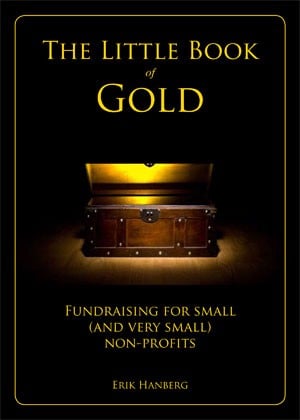Fractured Atlas Book Club: The Little Book of Gold
by Nathan Zebedeo, Program Specialist at Fractured Atlas
Educating yourself on fundraising — best practices, groundbreaking innovations, and the like — often involves reading books, blogs, and websites that travel a lot of the same ground. Which, on the one hand, can be somewhat tedious.
But on the other, hearing the same things many times, from a variety of voices, can allow the wisdom of the ages to actually penetrate a thick skull like my own. All of this is to say that it’s rare that I pick up a book on fundraising and find something that I’ve never heard before. The Little Book of Gold: Fundraising for Small (and Very Small) Nonprofits by Erik Hanberg actually does shed some new light on old problems for me, and I hope that it can be a useful resource for you too.
A bit of a caveat: I won’t say that this book is “riddled” with typos, but there are certainly more errors than I would prefer to find in a professionally published book. I believe that there is a newer edition than the one I read, which was published in 2009. But if whatever copy you pick up has a typo on, let’s say, the very first page, just chalk it up to the breathless excitement with which Erik Hanberg conveys his accumulated knowledge to us.
From his bio, we know that Mr. Hanberg was a fundraising wunderkind who, at age 23, shepherded along a nonprofit arts organization on a fundraising plan that increased contributions 400% over two years. So yeah, what did you accomplish in your early 20s?
With The Little Book of Gold, Erik Hanberg lays out a very actionable blueprint for a year of fundraising in the life of your organization. As a parable, he tells the story of a hypothetical historical society throughout to demonstrate how a game plan for stepping up your fundraising efforts might look in the real world. You might notice that this book is full of tips and tools that pertain mostly to soliciting and cultivating relationships with individual donors. Grantseeking gets a single short chapter in the book. Maybe this is because if you’re in your first year of fundraising (or if you’re finally taking fundraising seriously for the first time) you’re not quite ready to be a competitive grantseeker.
Artists and small arts organizations often encounter an initial queasiness when it comes to asking people for a financial contribution. This is also true for the executive director of the fictional historical society in this book, but Hanberg describes several strategies to get over that hurdle, including what data you need to gather at the outset so that you can be confident that you have the facts on your side when making an ask. A successful fundraising campaign always starts close to home with your nearest and dearest, or if you’re an organization, with your Board of Directors. Once you’ve got Board buy-in for all of your company’s activities, including fundraising, you can voyage out confidently into the world of asking strangers for money.
If you’re a bit lost at sea when it comes to how to to effectively work with your Board, then this book will point you in the right direction. There are a lot of good, thorough (which means thick) books out there to teach you more about board governance but if you’re a small (or very small) non-profit then these resources like will not be good for you. The nice thing about The Little Book of Gold is that it truly is a little book (slightly more than a hundred pages) that you can fit in your big for easy reference.
The section of this book that I was most interested in was the chapter on fundraising events, titled “Events Will Kill You.” Often, when casting about for fundraising ideas, someone will inevitably suggest that you host an event, which could mean a wide variety of things, from bake sale to silent auction to fundraising gala. Everyone likes the sound of fundraising events. What a nice safe idea that involves little effort on your part and isn’t threatening to donors because you’re providing them with a nice time in exchange for their gift. Right? Well, very often, no. Hosting a fundraising event can suck up a lot of your bandwidth — time that would be better spent on your actual programming (you know, creating art) or on more effective fundraising strategies.
Consider the opportunity cost if you only make a few hundred dollars (or even a few thousand) while investing the same amount of your own energy and funds on planning the event. One idea that Hanberg floats is to consider, instead of hosting an expensive auction, planning a fundraising breakfast. I’ve never suggested this to an artist or arts organization before, but I would be interested to know if any readers of this blog have tried out a breakfast event and if they’ve had any success?
The Fractured Atlas Book Club has been a little quiet lately — our last post was in October — but that’s because we want to make sure that we’re weeding the grain from the chaff, as it were, and providing you with good resources that you can put into practice right away. Have you encountered any excellent books that helped you achieve success? No reason to keep secrets among friends! Please email, tweet or Facebook us with the details so that we can share it on our blog.
About Nathan Zebedeo
Nathan Zebedeo is a graduate of NYU’s Tisch School of the Arts. In 2011, Nathan made the leap from card-carrying member of Fractured Atlas to an associate on our programs team, which he now co-manages. Prior to joining Fractured Atlas, Nathan helped produce celebrity author events at Barnes & Noble’s flagship Union Square location. Outside of work, Nathan directs the occasional play. He enjoys board games, learning languages, and travel.


